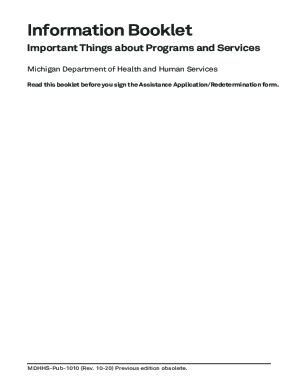Loading

Get Mi Dhs-pub-1010 2020-2026
How it works
-
Open form follow the instructions
-
Easily sign the form with your finger
-
Send filled & signed form or save
How to use or fill out the MI DHS-PUB-1010 online
This guide provides clear, step-by-step instructions on how to complete the MI DHS-PUB-1010 online, ensuring you can navigate the process smoothly. The MI DHS-PUB-1010 is a crucial form for accessing various assistance programs provided by the Michigan Department of Health and Human Services.
Follow the steps to effectively complete the MI DHS-PUB-1010 online.
- Click the 'Get Form' button to access the MI DHS-PUB-1010. This will open the form in the appropriate editor for completion.
- Begin by entering your personal information in the defined fields, including your name, address, and contact information. Ensure this information is accurate to prevent any delays in processing.
- Next, provide information about all members of your household. This includes listing each person and their relationship to you, even if they do not require assistance themselves.
- Proceed to specify your income details. You will need to provide information on all sources of income for your household. Be thorough to ensure a complete overview.
- Indicate any assets owned by you or members of your household. This includes banking information, property, and any other relevant financial details.
- Review all the entered information carefully for accuracy. Ensure there are no omissions or errors that could affect your application.
- Once you have verified all information, you can submit the form. After submission, you will typically receive further instructions or confirmation of receipt.
- Finally, you can save changes, download a copy of the completed form, print it for your records, or share it as necessary.
Take action today by filling out the MI DHS-PUB-1010 online to access the support you need.
Industry-leading security and compliance
US Legal Forms protects your data by complying with industry-specific security standards.
-
In businnes since 199725+ years providing professional legal documents.
-
Accredited businessGuarantees that a business meets BBB accreditation standards in the US and Canada.
-
Secured by BraintreeValidated Level 1 PCI DSS compliant payment gateway that accepts most major credit and debit card brands from across the globe.


